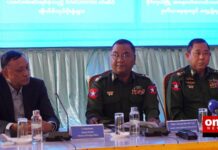Ethnic Pa-O, Shan-ni, Ta’ang and Wa representatives demanded self-administrated states at the Union Peace Conference held in Burma’s capital on Thursday.
During the five-day meeting in Naypyidaw, U Sai Paung Nub, a representative of the Wa Democratic Party (WDP), asked for a Wa state to be set up in six northern and eastern Shan State townships, which, according to 2008 constitution, have a Wa majority.
“The Wa people live in many places, such as Lashio, Tangyan, Keng Tung,” said U Zai Paung Nub. “In eastern Shan State, such as Mongton Township and Mongsat District, there are also Wa people. Therefore, we are demanding that these areas to be a Wa autonomous state.”
The sentiments were supported by the Pa-O, who have had a designated Pa-O Self-Administered Zone in the southern Shan State townships of Hsihseng, Hopong and Panglaung since 2010.
“What we are demanding is not for only Pa-O people, but also for other ethnic groups who should be recognized as [having] self-administrated states,” said Colonel Khun Okkar, the chairman of the Pa-O National Liberation Organisation (PNLO). “This includes the Wa and Ta’ang people.”
Ethnic Ta’ang (also known as Palaung) majority townships of Namhsan and Manton in northern Shan State have been designated as a self-administered zone. However, representatives from the Ta’ang National Party (TNP) requested that a separate Ta’ang State be formed in other parts of Shan State where Ta’ang people live.
The Shan-ni, or the “Red Shan,” also demanded, through their party, the Tai-Leng Nationalities Development Party (TNDP), a self-administrated Shan-ni state comprised of parts of Kachin State and Sagaing Division.
“Instead of splitting into states, why we don’t help each other and work together based on the principles of the Panglong Agreement?” asked Sai Leik, spokesperson for the Shan Nationalities League for Democracy (SNLD), citing the landmark 1947 accord promising autonomy and equality to Burma’s ethnic nationalities.
As to why this conflict might have developed, Sai Leik attributed it to the fact that “the ethnic nationalities who formed the union have never had their rights honored.”
The Union Peace Conference, being held from January 12-16, marked the beginning of a political dialogue between the Burmese government and the country’s eight non-state armed groups who signed the controversial Nationwide Ceasefire Agreement (NCA) in October 2015. The meeting was attended by over 1000 representatives from government, parliament, military, political parties, civil society organizations and international representatives. Boycotting the event were over 100 civil society organizations, in protest of ongoing conflict, and the ethnic armed groups who were not signatory to the NCA on the grounds that it was not inclusive.
By SAI AW / Shan Herald Agency for News (S.H.A.N)












Leave a Comments